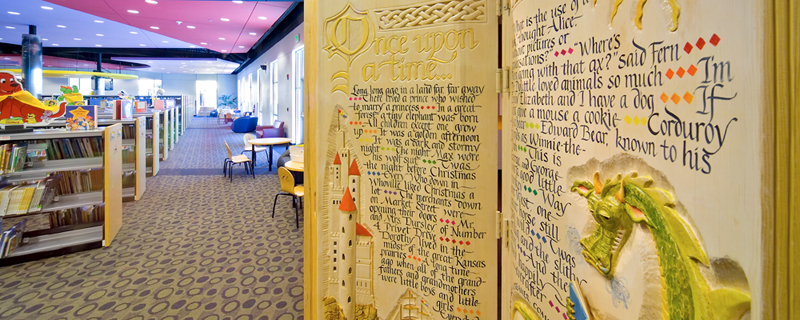

 First Things First, Kids and Libraries
First Things First, Kids and LibrariesTeachers receive a complimentary First Things First book bag with enough library card applications your school's first grade students.
Exclusive for only first grade students from throughout San Juan County! Show your library card in the Youth Services Department and get a free canvas book bag.
E-mail youthtours@infoway.org the following information:
Tell all first grade teachers at your school that you are requesting First Things First and see if they want to schedule a visit by the library at your school for First Things First.
Email us two dates the first date being your first choice, your name, school and phone.
We will follow-up with an e-mail you or contact you.
We will want to know if you can reserve the school library for a story time and First Things First presentation.
We will only take 30 to 45 minutes.
If you have any questions, please call 505-566-2200.
Set regular times for reading, such as bedtime or while your child eats breakfast before school. Aim for "mutual delight," not for "the good of the child."
Let your child doodle or scribble while you read aloud, if he or she has trouble sitting still. Remember that your child's "favorite friend" be it a doll or stuffed animal, may like to hear the story, too.
Record some favorite books on tape so your child can "read along" or simply listen when he or she is too tired to make the effort to read. Have an older child tape some books as an extra-special gift.
Encourage your child to read at least one chapter of a book every night.
Make reading a reward. For example, expand "lights-off" time by allowing quiet reading alone in bed for a few extra minutes, or use a "time bank" to balance reading and TV time.
Let your child earn his or her allowance by reading, or make an outright payment of a dime or so an hour (better than candy!). Negotiate the matter of which books are read (but don't always require "good" books) and ask for short verbal reports on them. Have your child sometimes tape reports for later enjoyment.
Try to get your child to keep a reading diary; besides giving him or her a sense of accomplishment, it will be a momento in later years. Decorate your child's room with a paper chain or "bookworm" made by adding the name of each book read on a separate section.
Sneak in some reading practice by singing songs together from sheet music.
When your child selects books and reads alone, "borrow" the books and read them yourself so you can discuss them together. Watch for sexist and racist overtones and point out examples of each to your child.
Encourage your children to really read the books they buy. Purchase books at school book fairs and have your children pay for them initially and "buy them back" yourself when they've been read.
Ignore your child's reading level sometimes. If he or she is fascinated by dinosaurs or bugs, give him or her everything you have on the subject; it's not necessary that every word or thought be understood perfectly. Likewise, let your child read "baby" books sometimes, just for fun.
Provide a comfortable, cozy place for your child to read alone (beanbag chairs are favorites), and be sure the lighting is adequate.
Assign each child a shelf or two in a bookcase for his or her favorite books, and make it a family tradition to add a special book at each gift-giving occasion.
Use newspapers and magazines as reading-practice tools. Help your child collect illustrated stories about animals, babies or nature for scrapbooks or bulletin boards.
Allow your children to open your junk mail and decide what's to be saved and what's to be tossed.
Encourage your children to follow the ongoing stories in the newspaper comics, check the weather predictions, follow the home teams in sports, and read the movie adds. Newspaper display adds will show them what's available and for how much. The index in the classified section (and in catalogs) will help them sharpen alphabetizing skills and learn how to find information they want.
Ask your child for his or her opinions about news items you read together in the newspaper.
Let your child read the recipe to you when you're cooking together. Don't overlook the value of such things as writing on the breakfast cereal boxes, the signs on the side of the road, and the words on the television screen.
Leave the television program schedule where your child can find it easily and browse through it.
Save old catalogs for browsing, too, and provide price lists and brochures pertaining to your child's hobbies.
Pick a word every week (or every day) for the whole family to concentrate on learning and using. Post it on the refrigerator door and see how many times everyone can work it into everyday conversation.
Read WITH instead of TO your child, asking questions and stopping occasionally to discuss what might happen next.
Ask your child occasionally to act out what's going on in a story.
Let your child point to words as they're being read; it's a way to increase concentration. Encourage the use of two fingers-----or the whole hand-----to help him or her grasp more than one word at a time.
Or let your child use a flashlight as a cursor to help increase reading speed.
Help your child understand a passage by explaining "what to look for." For example, "Now see how Billy gets the other children to do what he wants them to."
Ask what the "action" words are, and what "describes" a person, a thing, or an event.
Don't discourage lip movement when your child reads silently; experts now realize that "silent speech" helps young readers improve comprehension.
Get your child his or her own library card to be responsible for... it's an "adult" thing to do.
Help your child become acquainted with the librarian and the services offered by the library, such as reserving books.
Keep a special notebook or pad for questions that come up (for example "what causes tornadoes," or "who invented baseball") so you can take them to the library on your next trip.
Encourage your child to join any reading programs available through your public library. A program based on children's classics may be offered by your library for those who can read well, and participation will offer a child a chance to read and discuss good books with a competent adult and with other kids.
Show a child of eight or nine how to look up books by favorite authors and those subjects of special interest.
Teach your child to check the table of contents and the preface or introduction to a book to find out what's in it.
Once you're home with the newly checked-out library books, find a special shelf or other place to keep them so they won't get mixed up with your child's own books. You might use a special book bag for library books.
Teach responsibility for borrowed books by marking the due date on your calendar or posting a list of books and their due dates on your refrigerator door and returning them on time.
Farmington Public Library ~2101 Farmington Ave. Farmington NM 87401 ~ 505-599-1270 |